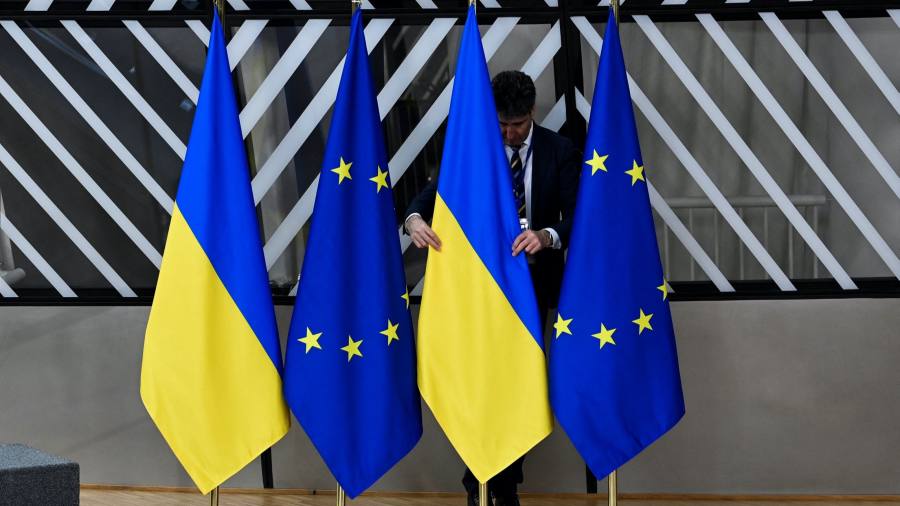Receive free War in Ukraine updates
We’ll send you a myFT Daily Digest email rounding up the latest War in Ukraine news every morning.
The EU is preparing to offer “future security commitments” to Ukraine as the bloc’s leaders seek to agree long-term pledges for Kyiv against the backdrop of rising instability in Russia and entrenched battle lines in the war.
Discussions over the pledge, which is included in the draft conclusions of Thursday’s summit of EU leaders, come as the modest progress of Ukraine’s counteroffensive and the fallout from Wagner’s failed mutiny in Russia prompt capitals to rethink what support levels Kyiv requires.
EU members France and Germany, alongside the UK and US, have led efforts to agree bilateral security arrangements to provide Ukraine with long-term financing, military supplies, training and intelligence aimed at helping it repel Russia’s full-scale invasion and protect it from future aggression.
While falling well short of the mutual defence that would come with Nato membership, the pledges are designed to provide some form of stop-gap to reassure Kyiv and give it confidence in enduring western support.
The proposed EU declaration, devised by France, is aimed at sending “a very clear political signal” to Ukraine and Russia, according to one diplomat involved in the discussions. It is also seen as ensuring the bloc has a stake in the broader security framework being devised to protect Ukraine and is not sidelined by US-led Nato, according to a second official.
But it has met resistance from Ireland, Malta and Austria, the bloc’s neutral states, according to officials briefed on the discussions, who want clarity on what the “commitments” would entail.
The draft leaders’ statement seen by the Financial Times states the EU and its member states “stand ready to contribute, together with partners, to future security commitments to Ukraine, which will help Ukraine defend itself in the long term, deter acts of aggression and resist destabilisation efforts”.
It adds that work will being to “swiftly consider the modalities of such contribution”, while taking account of the “securing and defence policy of certain member states”, a reference to neutral countries. The text could be changed before its adoption.
Some member states said the idea of “commitments” was very loosely defined and requested a more formal outline from the EU’s foreign policy arm.
“We are already doing quite a lot about security commitments,” said an EU diplomat, referencing the bloc’s financial support to Kyiv and its initiatives to source, produce and supply increased levels of ammunition.
Asked about the security commitment pledge, Kaja Kallas, Estonia’s prime minister, said it is for “every separate ally” to decide what they could do. “But what is important is that we say that this is the common way,” Kallas said on Wednesday.
“We are working on [the wording]. We do not want to have hollow, empty words.”
Ukraine’s hard-fought but slow progress against heavily fortified Russian positions in occupied south-east Ukraine has doused hopes in some capitals of a quick battlefield breakthrough that could prompt peace talks.
At the same time, Russian warlord Yevgeny Prigozhin’s mutiny against the country’s top brass has raised questions over the unity of Russia’s military and how Ukraine can best exploit that.
“For better or worse the outcome [of the counter-offensive] is going to impact everything we do regarding Ukraine, and we are all aware of that,” said one senior European diplomat, who like others requested anonymity given the sensitivity of the topic. “Funding, support, political engagement . . . and most importantly the peace talks that are coming whether we like them or not.”
General Christopher Cavoli, Nato’s top commander in Europe, told a private gathering last week that the counter-offensive had not yet achieved significant successes and was struggling against Russia’s defences. “Russia still has the advantage of mass,” he said, according to people present.
Russia has more than 400,000 troops engaged in the war, according to Ukrainian and western estimates, more than it had in February last year when president Vladimir Putin ordered the invasion.
SHAPE, Nato’s military headquarters, declined to comment on Cavoli’s private remarks. It said in a statement: “Nato has been observing the conflict in Ukraine closely since the onset . . . The next stage of their fight may be long and hard but we will continue to do everything we can to help Ukraine win its existential fight.”
Additional reporting by Andy Bounds and Ian Johnston in Brussels
Read the full article here




